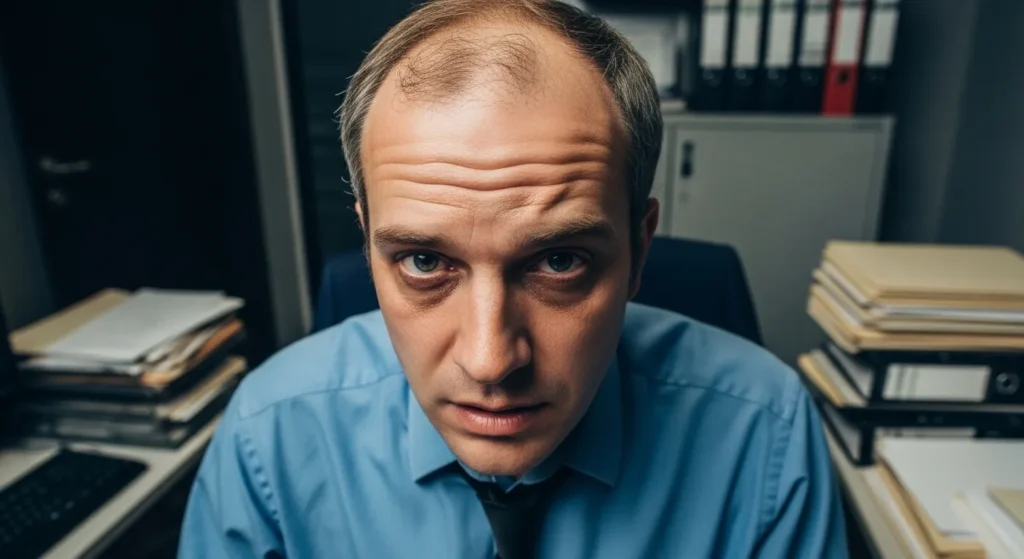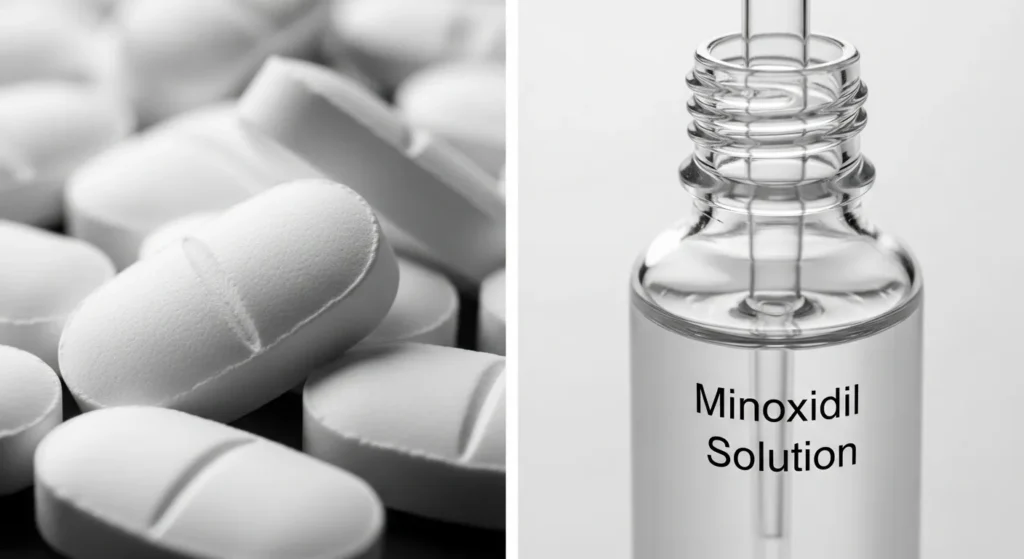Are you noticing sudden hair shedding, thinning, or bald patches during periods of intense stress? Stress-related hair loss in men is a medically recognized condition that can impact your appearance and confidence.
In this guide, you’ll discover the causes, signs, and effective treatments for hair loss caused by emotional or physical stress. Learn how to identify it, stop it early, and encourage healthy regrowth—with tips from experts and real recovery examples.
What Is Stress-Related Hair Loss in Men?
Stress-related hair loss occurs when physical or emotional stress disrupts the natural hair growth cycle. While hair shedding is normal (losing 50–100 hairs a day), excess stress can push more hair follicles into the resting (telogen) phase, leading to noticeable thinning.

How Stress Affects Your Hair Growth Cycle
Hair growth follows a cycle: anagen (growth), catagen (transitional), and telogen (resting). Under stress, the body can trigger more follicles to prematurely enter the telogen phase, causing telogen effluvium, a common stress-related condition.
Types of Hair Loss Linked to Stress
- Telogen Effluvium: The most common type, resulting in diffuse thinning across the scalp.
- Alopecia Areata: An autoimmune response where the body attacks hair follicles, often linked to chronic stress.
- Trichotillomania: A stress-driven compulsion to pull out one’s hair.
What Are the Signs of Stress-Induced Hair Loss?
Stress-related hair loss may look different from hereditary baldness or scalp diseases. Common signs include:
Sudden Hair Shedding
You may notice large amounts of hair on your pillow, in the shower, or while brushing.
Thinning on Top or Sides
Stress hair loss usually affects the entire scalp evenly, but can appear more pronounced in certain areas.
Bald Patches or Broken Hair
In the case of alopecia areata or trichotillomania, circular bald patches or broken strands may develop suddenly.
What Causes Stress Hair Loss in Men?
Emotional Stress
- Anxiety, panic attacks, relationship stress, and depression can all impact hormone levels that regulate the hair cycle.
Physical Stress
- Illness, major surgery, weight loss, or even a fever (e.g., after COVID-19) can shock the system and trigger telogen effluvium.
Lifestyle Factors
- Poor sleep, excessive alcohol, nutritional deficiencies, or overwork contribute to stress and hair thinning.
How Long Does Stress-Related Hair Loss Last?
Duration of Hair Loss Episodes
Typically, telogen effluvium lasts about 3 to 6 months, after which the hair starts to regrow if the underlying stressor is managed.
Factors That Affect Recovery Time
- Chronic stress
- Unresolved emotional trauma
- Nutritional deficiencies
- Ongoing illness
Can Hair Grow Back After Stress?
Yes—once the stress is under control, regrowth usually begins within months. Most men see full recovery, although regrowth may be slower with age.
Diagnosis: Is Your Hair Loss Due to Stress or Something Else?
When to See a Dermatologist or Trichologist
If hair loss is persistent, patchy, or accompanied by itching or scaling, consult a specialist for a proper diagnosis.
Blood Tests and Scalp Analysis
A trichologist may recommend:
- Thyroid and iron level tests
- Hormonal panels
- Scalp microscopy
Differentiating Stress Hair Loss from Male Pattern Baldness
Male pattern baldness usually starts with a receding hairline or crown thinning and progresses gradually. Stress-related loss is more sudden and diffuse.
Treatment Options for Stress-Related Hair Loss
Medical Treatments
- Minoxidil (Rogaine): FDA-approved topical solution that promotes regrowth and improves blood flow.
- Finasteride: Prescribed cautiously; mainly for androgenetic alopecia but sometimes considered in mixed cases.

Stress Management Techniques
- Cognitive Behavioral Therapy (CBT)
- Meditation and mindfulness
- Deep breathing and journaling
Nutritional and Lifestyle Interventions
- Eat a diet rich in biotin, zinc, protein, and iron
- Hydration, quality sleep, and limiting caffeine/alcohol
Non-Invasive Procedures
- PRP (Platelet-Rich Plasma) Therapy: Boosts healing and follicle regeneration.
- Low-Level Laser Therapy (LLLT): Stimulates follicles with red light.

Can Stress Hair Loss Be Prevented?
Early Warning Signs to Watch For
- Clumps of hair falling out after emotional distress
- Delayed shedding 2–3 months post-stressful event
- Loss without scalp irritation or infection
Long-Term Strategies for Managing Stress
- Regular physical activity
- Sleep hygiene and routine
- Building support networks
Ideal Recovery Timeline
- Weeks 1–4: Manage stress, start a hair-friendly diet.
- Months 2–3: Begin treatments like PRP or Minoxidil.
- Months 4–6: Noticeable regrowth with continued improvement.
Combining Therapy and Treatment
Mental wellness, lifestyle improvements, and hair care protocols work best together.
FAQs About Stress Hair Loss in Men
Can stress cause permanent hair loss?
Usually no. In most cases, hair regrows after stress is resolved.
How fast does hair fall out from stress?
Typically, 2–3 months after a stressful event, due to a hair cycle delay.
Can hair loss from stress grow back naturally?
Yes, especially if the hair follicles remain healthy and stress is controlled.
Should I take supplements?
Supplements like biotin, iron, and vitamin D can support regrowth, but should be medically advised.
Is hair transplant an option for stress-related loss?
Hair transplants are not typically recommended unless the condition becomes chronic or irreversible.
Ready to Regrow Your Hair?
If you’re experiencing stress-related hair loss, don’t wait for it to worsen. Book a consultation with Dr. Rana Irfan, an ABHRS and ISHRS certified surgeon in Islamabad today for personalized care, diagnostic support, and advanced treatment options.
